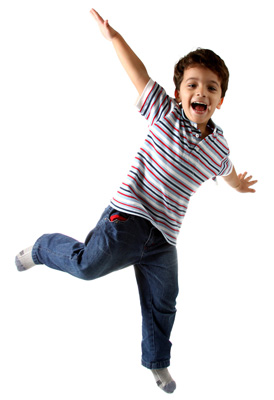What to Expect as Your Child Grows:
Well Child Care at 7 Years
Social Skills
- Your child usually has a best friend of the same sex at this age.
- May show growing concern about popularity among peers.
- Seeks approval of peers and adults.
Mental Development
- Your child's language skills are developing rapidly.
- They may have trouble with concepts of honesty and dishonesty.
- Help your child develop good homework habits. You should designate a regular location and time to work on assignments. It should be well lit and quiet, without distractions from the television or other children playing.
- Some children may request that you sit with them as they do their homework. Do not do the homework for them. If your child routinely requires your participation to get the homework done, talk to his teacher.
Reading and Electronic Media
Limit electronic media (TV, DVDs, and computers) time. Participate with your child and discuss the content together.
Dental Care
- Your child should brush and floss his teeth at least twice a day and should have regular visits to the dentist.
- Parents need to check their child's teeth after he has brushed.
Safety Tips
- Fires and Burns
- Practice a home fire escape plan.
- Keep a fire extinguisher in or near the kitchen.
- Tell your child about the dangers of playing with matches and lighters.
- Teach your child the emergency phone numbers and to leave the house if a fire breaks out.
- Turn your water heater down to 120° Fahrenheit. - Falls
- Do not let your child use outdoor trampolines.
- Make sure windows are closed or have screens that cannot be pushed out. - Car Safety
- Everyone in a car must always wear seat belts or be in an appropriate booster seat.
- Do not buy motorized vehicles for your child. - Pedestrian and Bicycle Safety
- Supervise street crossing. Your child may start to look in both directions, but is not ready to cross a street alone.
- All family members should ride with a bicycle helmet.
- Do not allow your child to ride a bicycle near busy roads.
- Children who ride bicycles that are too big for them are more likely to be in bicycle accidents. Make sure the size of the bicycle your child rides is right for your child. Your child's feet should both touch with the ground when your child stands over the bicycle. The top tube of the bicycle should be at least two inches below your child's pelvis. - Strangers
- Discuss safety outside the home with your child.
- Be sure your child knows his home address, phone number, and the name of his parents' place(s) of work.
- Remind your child never to go anywhere with a stranger.
Smoking
- Children who live in a house where someone smokes have more respiratory infections. Their symptoms are also more severe and last longer than those of children who live in a smoke-free home.
- If you smoke, set a quit date and stop. Set a good example for your child.
What to Expect at This Visit
- Your child may already be current on all recommended vaccinations.
- Children over six months of age should receive an annual flu shot.
- We will be checking your child's hearing and vision.
Next Visit
The American Academy of Pediatrics recommends that your child's next routine check-up be at eight years of age.



